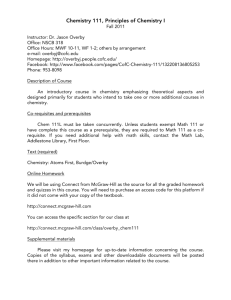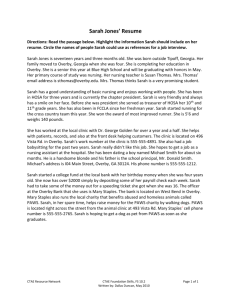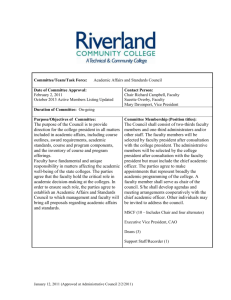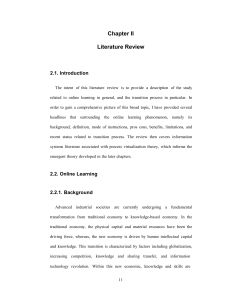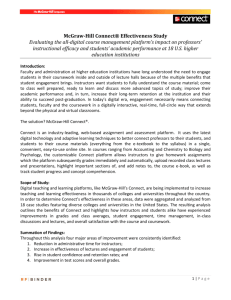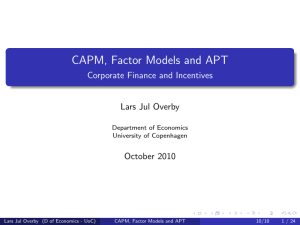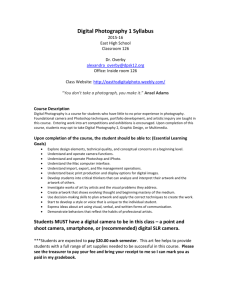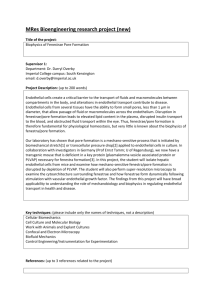File - Article 9 Society
advertisement
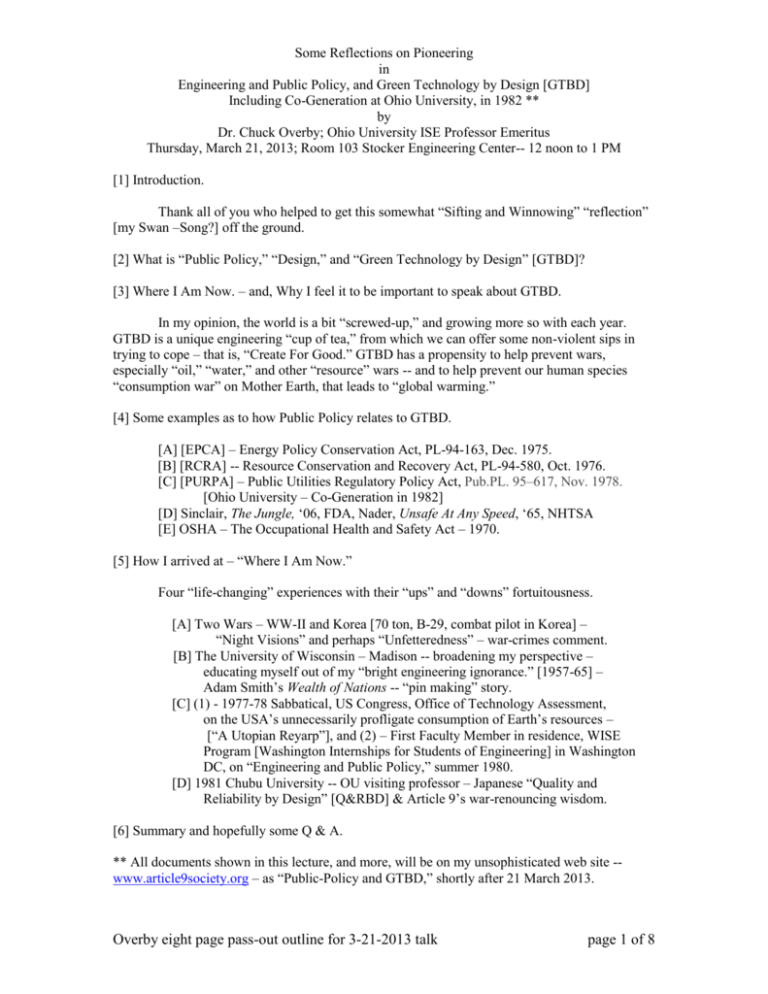
Some Reflections on Pioneering in Engineering and Public Policy, and Green Technology by Design [GTBD] Including Co-Generation at Ohio University, in 1982 ** by Dr. Chuck Overby; Ohio University ISE Professor Emeritus Thursday, March 21, 2013; Room 103 Stocker Engineering Center-- 12 noon to 1 PM [1] Introduction. Thank all of you who helped to get this somewhat “Sifting and Winnowing” “reflection” [my Swan –Song?] off the ground. [2] What is “Public Policy,” “Design,” and “Green Technology by Design” [GTBD]? [3] Where I Am Now. – and, Why I feel it to be important to speak about GTBD. In my opinion, the world is a bit “screwed-up,” and growing more so with each year. GTBD is a unique engineering “cup of tea,” from which we can offer some non-violent sips in trying to cope – that is, “Create For Good.” GTBD has a propensity to help prevent wars, especially “oil,” “water,” and other “resource” wars -- and to help prevent our human species “consumption war” on Mother Earth, that leads to “global warming.” [4] Some examples as to how Public Policy relates to GTBD. [A] [EPCA] – Energy Policy Conservation Act, PL-94-163, Dec. 1975. [B] [RCRA] -- Resource Conservation and Recovery Act, PL-94-580, Oct. 1976. [C] [PURPA] – Public Utilities Regulatory Policy Act, Pub.PL. 95–617, Nov. 1978. [Ohio University – Co-Generation in 1982] [D] Sinclair, The Jungle, ‘06, FDA, Nader, Unsafe At Any Speed, ‘65, NHTSA [E] OSHA – The Occupational Health and Safety Act – 1970. [5] How I arrived at – “Where I Am Now.” Four “life-changing” experiences with their “ups” and “downs” fortuitousness. [A] Two Wars – WW-II and Korea [70 ton, B-29, combat pilot in Korea] – “Night Visions” and perhaps “Unfetteredness” – war-crimes comment. [B] The University of Wisconsin – Madison -- broadening my perspective – educating myself out of my “bright engineering ignorance.” [1957-65] – Adam Smith’s Wealth of Nations -- “pin making” story. [C] (1) - 1977-78 Sabbatical, US Congress, Office of Technology Assessment, on the USA’s unnecessarily profligate consumption of Earth’s resources – [“A Utopian Reyarp”], and (2) – First Faculty Member in residence, WISE Program [Washington Internships for Students of Engineering] in Washington DC, on “Engineering and Public Policy,” summer 1980. [D] 1981 Chubu University -- OU visiting professor – Japanese “Quality and Reliability by Design” [Q&RBD] & Article 9’s war-renouncing wisdom. [6] Summary and hopefully some Q & A. ** All documents shown in this lecture, and more, will be on my unsophisticated web site -www.article9society.org – as “Public-Policy and GTBD,” shortly after 21 March 2013. Overby eight page pass-out outline for 3-21-2013 talk page 1 of 8 A UTOPIAN REYARP ** Our father which art in stuff, Hallowed be thy game. Thy products come As it is in thy con-sump-shun-dum. Gorge us this day with our daily bread, big mac’s, and artichoke delicacies -while other bellies bloat as starvation raves. Dry our tears -rivers of pollution. Forgive us our lagging g n p. As we forgive those who would change its distribution. Advertise us into temptation so that our bellies swell armpits smell sweet – and Humvees and SUVs deliver us to glory, on other people’s oil -while valium, crack, prozac, pot, and alcohol nightly give us, peace. Deliver us from heresy which strangely gnaws at our bones -Could thou be a false god? But no -For thine is the kingdom of consumption, The power and glory in things, For ever and ever ah-man and wo-man -Have we arrived lost? ** prayer spelled backwards © chuck overby Athens, Ohio September 1977 (modified periodically as technologies change) This “prayer poem” was written in the late 1970s when I worked in Washington DC on sabbatical in the United States Congress, Office of Technology Assessment. My professional engineering task was to examine some of the enormity of United States resource consumption, our wastefulness as a nation – and to make some recommendations for improvement. This poem is one of my ecological engineering -- “GreenTechnology-By-Design” pieces. From this fulfilling Washington experience I learned much about America’s real god. Overby eight page pass-out outline for 3-21-2013 talk page 2 of 8 World War II and Korean War Boeing B-29 Superfort 70 tons gross weight 10 ton bomb load 23.5 ton fuel load [6,400 gallons] NIGHT VISIONS Penetrating black voids in night ahead brightened with july fourth-like works of fire -Steady on course into colored holocausts become hard metal with rockets red glare -While below bombs burst everywhere -our gifts to “gooks” and our flag “is” still there. © chuck overby; 6/7/78 Korean War B-29 pilot Founder the Article 9 Society; 3/18/91 Transferring technology to serve the needs of humans everywhere, killing at each other -- B-29 night bombing in Korea. Anti-aircraft fire [flak] at night looks like 4th of July fireworks. Some U. S. national anthem words of violence find their way into this poem. I would prefer something beautifully and thoughtfully gentle like Sibelius’ “Finlandia” as a national anthem. The term “gooks” was a common “term of endearment” used in the US military in the Korean War for North Korean and Chinese people who happened to be the “enemy” of the day. FINLANDIA (Words by Lloyd Stone 1933 ?) (Music by Jean Sibelius, 1899) This is my song, O God of all the nations, A song of peace, for lands afar and mine. This is my home, the country where my heart is, Here are my hopes, my dreams, my holy shrine. But other hearts in other lands are beating With hopes and dreams as true and high as mine. My country’s skies are bluer than the ocean, And sunlight beams on cloverleaf and pine, But other lands have sunlight too, and clover, And skies are everywhere as blue as mine. O hear my song, thou God of all the nations, A song of peace for their land and mine. Overby eight page pass-out outline for 3-21-2013 talk page 3 of 8 Where I Am Now As I say on my “outline” sheet -- The world is a bit “screwed-up,” and growing more so with each passing year. GTBD is a unique engineering “cup of tea,” from which we can offer some non-violent sips in trying to cope – that is, “Create For Good.” GTBD has a propensity to help prevent wars, especially “oil,” “water,” and other “resource” wars -- and to help prevent our human species’ “consumption war” on Mother Earth, called “global warming.” I have arrived at my ripe young age of 87, seeing this nation of ours, the USA today, as an empire consisting of over 1,000 foreign military bases circling the globe 1. The most recent one being the Marine base that President Obama set up about a year ago in that beautiful little city, Darwin, on the north coast of Australia. There are no military solutions to “resource scarcity,” “global warming,” or population growth – and as Paul Kennedy [1987] and Edward Gibbon [1776] in their writings on “The Rise and Fall of Empires” suggest -- empires have a habit of collapsing as military commitments grow2. I see this empire of foreign military bases, in part, as existing so as to assure that we in the USA have a continuing supply of Planet Earth’s finite and dwindling resources so as to enable us to continue enjoying our profligate US life style – and to unload our culture’s “material goodies” around the world. This materialist culture that we have pioneered in propagating across Planet Earth is quite attractive to those who live in poorer, high population nations such as China, India, Africa, Southeast Asia etc., China proposes that it will have an 8 % economic growth rate in 2013-14. This greed-driven, profligate, and inequitable “possessive-individualist” consumption culture of ours turns our beautiful Mother Earth’s resource treasures into entropic randomness and globally warms us to Martian lifelessness while we increasingly fight, or threaten to fight, resource wars over the declining resource bases that range from oil to rare earth materials etc. In my opinion, we as a species must learn to create more “just” and “zero-material-consumption-growth” [ZMCG] cultures that enable human-animal fulfillment and meaningful human lives without killing the planet with our profligate “consumptions” and/or perpetual wars. We as a species must also learn how to enjoy the existential pleasures of sex without producing so many new little human animals to gobble up our beautiful Planet Earth home, that is “Zero Population Growth [ZPG]. Fulfillment of this urgent “need” is fraught with much complexity and difficulty in that it opens the door to tons of “species-suicidal” sacrosanct and unassailable cultural and religious myths and beliefs. Creating ZMCG and ZPG cultures presents us as a species, with humongous challenges. Green Technology by Design [GTBD] can be of some help in moving us toward ZMCG cultures -- if we can find ways to get our USA culture to ask this of us engineers and scientists, rather than using so very many of us in military war systems3. ------------------------------------------1. See my Growth-A-Mania list -- Johnson, Chalmers, Dismantling The Empire: America’s Last Best Hope, Henry Holt, 2010, or any of the multitude of his internationalist writings. 2. See my Growth-A-Mania list -- Kennedy, Paul, The Rise and Fall of the Great Powers: Economic Change and Military Conflict, from 1500 to 2000, Vintage Books, 1987 – and -Gibbon, Edward, The History of the Decline and Fall of the Roman Empire, six volumes, 1776-1788, London. 3. See my Growth-A-Mania list -- Melman, Seymour, editor, The War Economy Of The United States:… -Melman estimates up to 30 % of USA engineers employed, full or part-time, directly or indirectly in the weapons game. Overby eight page pass-out outline for 3-21-2013 talk page 4 of 8 GROWTH-A-MANIA Some books, mostly new ones, and a few papers on themes related to my concerns and interests in Engineering and Public Policy, Economic Growth, Green Technology by Design [GTBD] --and a few other related matters. by -- Chuck Overby Atkins, Peter, Four Laws That Drive The Universe, [The Laws of Thermodynamics], Oxford University Press, 2007. Barnes, Peter, Capitalism 3.0: A Guide to Reclaiming the Commons, Berrett-Koehler, 2006. Bentham, Jeremy [1748-1832], A Introduction To The Principles of Morals and Legislation,[Utilitarianism] London, 1789 – Hafner Publishing Co., 1961 – see also Ryan below. Daly, Herman E, Beyond Growth: The Economics of Sustainable Development, Beacon Press, 1996. Dietz, Rob, and O’Neill, Dan, Enough Is Enough: Building a Sustainable Economy in a World of Finite Resources, Berrett-Koehler, 2013. See -- www.commondreams.org/view/2013/02/25-1. Daedalus, the entire issue, “The Alternative Energy Future,” Vol. 142. Issue 1, vol. 2, Winter 2013 Eisler, Riane, The Real Wealth of Nations: Creating a Caring Economy, Berrett Koehler Pub., 2007. Frank, Robert H., The Darwin Economy: Liberty, Competition, and the Common Good, Princeton Univ. Press, 2011 Georgescu-Rogen, Nicholas, The Entropy Law and the Economic Process, Harvard Univ. Press, 1971. Georgescu-Rogen, Nicholas, Energy and Economic Myths: Institutional and Analytical Economic Essays, Pergamon Press, 1976. Gibbon, Edward, The History of the Decline and Fall of the Roman Empire, six volumes, 1776-1788, London. Gilding, Paul, The Great Disruption: Why the Climate Crisis Will Bring On the End of Shopping and the Birth of a New World, Bloomsbury 2011. Hansen, James, Storms of my Grandchildren: The Truth About the Coming Climate Catastrophe and Our Last Chance to Save Humanity, Bloomsbury, USA 2009. Hedges, Chris, “Will We Adjust to Life on a Finite Planet or Continue Devouring Our Future?”, Truthdig, Op-Ed, 14 January 2013. Jackson, Tim, Prosperity Without Growth: Economics for a Finite Planet, Earthscan, 2011 Johnson, Chalmers, Dismantling The Empire: America’s Last Best Hope, Henry Holt, 2010. . Judt, Tony, Ill Fares The Land, Penguin Press 2010. Keen, Steve, Debunking Economics – Revised and Expanded Edition: The Naked Emperor Dethroned?, Zed Books, 2011. Kennedy, Paul, The Rise and Fall of the Great Powers: Economic Change and Military Conflict, from 1500 to 2000, Vintage Books, 1987. Kennedy, Paul, Preparing For The Twenty-First Century, Vintage Books, 1993. Overby eight page pass-out outline for 3-21-2013 talk page 5 of 8 Klare, Michael T., The Race For What’s Left: The Global Scramble For The World’s Last Resources, Henry Holt 2012. Korten, David C., Agenda For A New Economy: From Phantom Wealth to Real Wealth, B-Koehler, 2009. Heinberg, Richard, The End of Growth: Adapting to Our New Economic Realty, The New Society, 2011. Locke, John, The Second Treatise of Government, 1690, Bobbs-Merrill 1975 – Locke on property and consuming earth’s resources, “… at least where there is enough and as good left in common for others.” Lewis, A., editor, Of Men and Machines, Dutton, 1963, Forster, E. M., “The Machine Stops,” pp 261-291. Malthus, Thomas, R., An Essay on the Principles of Population, or A View of the Past and Present Effects on Human Happiness, 1798 – reprinted as Population: The First Essay, with a Foreword by Kenneth E. Boulding, Ann Arbor Paperbacks, The University of Michigan Press, 1969 Meadows, Donella and Dennis and others, Limits to Growth: A report for The Club of Rome’s Project on the Predicament of Mankind, New York, New American Library 1974. Melman, Seymour, editor, The War Economy Of The United States: Readings on military industry and economy, St. Martin’s Press, New York, 1971. Also see -- Gardner, Dana L, “What Defense Cuts Mean to Engineering,” Associate editor, Design News - Engineering News, 26 Feb., 1990, pp 23-24, where Melman suggests that in about 30 % of engineers work on military ”stuff.”. Moore, Sir Thomas, [lived 1478-1535], Utopia, the book published in 1516 – the word [utopia] from Greek [ou-topos] meaning no-place or no-where. Nader, Ralph, Unsafe At Any Speed, 1965 -- helped to bring about, “The Traffic and Motor Vehicle Safety Act 1966 and The National Highway Traffic Safety Administration, NHTSA O’Connor, Martin, editor, Is Capitalism Sustainable?: Political Economy and the Politics of Ecology, The Guilford Press, 1994. Overby, Kunihiro, and Momoi, A Call For Peace: The Implications of Japan’s War-Renouncing Constitution, Kodansha [1997 and 2003] or Tachibana 2005 -- GTBD for Japan. pp 173 – 201 and /// Overby, “Product Design For a Sustainable Future: A Matter Of Ethics?” , 1980 ASEE Annual Meeting Proceedings, pp 511-519 /// also see separate list -- “Overby Publications on GTBD – A Sample.” Packard, Vance, The Waste Makers, D. Mckay Co., NY 1960 Patel, Raj, The Value Of Nothing: How To Reshape Market Society And Redefine Democracy, Picador Edition, 2010. Rawls, John, A Theory of Justice, Harvard University Press, 1971. Redman, Charles L., Human Impact on Ancient Environments, Univ. of Arizona Press, 1999. Rifkin, Jeremy, Entropy: A New World View, Viking Press, 1980. Riley, Donna, Engineering and Social Justice, Morgan & Claypool, 2008 – also e-book -- ISBN, 9781598296273 Ryan, Alan, editor, Utilitarianism and Other Essays: J. S. Mill and Jeremy Bentham, Penguin Books 1987. Sandel, Michael, J., Justice: What’s The Right Thing To Do?, Farr, Strauss and Giroux, New York, 2009. See a 2013 Sandel PBS Video on “Justice.” Sandel, Michael, J., What Money Can’t Buy: The Moral Limits of Markets, Farr, Strauss and Giroux, New York, 2012. Overby eight page pass-out outline for 3-21-2013 talk page 6 of 8 Schumacher, E. F., Small Is Beautiful: Economics As If People Mattered, Harper & Row, 1973. Sibley, Mulford, Political Ideas and Ideologies, Harper & Row, 1970 – also, NEH Summer Seminar on “Ideals And The Quest For Utopia,” [1977] Sinclair, Upton, The Jungle, 1906 -- helped to create the “Pure Food and Drug Act of 1906 and the U. S. FDA Smith, Adam, The Wealth of Nations, London 1776. Speth, James, G., America The Possible: Manifesto for a New Economy, Yale Univ. Press, 2012. Stone, Oliver & Kuznick, Peter, The Untold History of the United States, Simon & Schuster, 2012. Tainter Joseph A., The Collapse of Complex Societies, Cambridge University Press, 1998. Utopian and Dystopian novels – Bellamy, Edward, Looking Backward – 2000-1887 [1887] Zamyatin, Yevgeny, We, [1924]; Huxley, Brave New World [1932], Orwell, 1984, [1949] Victor, Peter, A., Managing Without Growth: Slower by Design, Not Disaster, Edward Elgar Pub., 2008. Worldwatch Institute, State of the World 2012, Moving Toward Sustainable Prosperity, Island Press, 2011. Wright, Ronald, A Short History of Progress, Carroll & Graf Publishers, 2004; and, What Is America?: A Short History of the New World Order, DA Capo Press, 2008. Zinn, Howard, A People’s History of the United States, Harper Collins, 1999. Overby eight page pass-out outline for 3-21-2013 talk page 7 of 8 Some Overby Publications Related to GTBD and Public Policy Overby, C. M., “Reflections on an Article 9 Without Borders,” Dharma World, [with GTBD suggested for Japan], January-March, 2008, pp 38-41. Overby, C. M., “The Treasure of Japan’s Article 9: The World’s Foremost Law For Peace, Justice, And Non-Violent Conflict Resolution,” a chapter in Boersema, and Brown, [editors], Spiritual And Political Dimensions Of Nonviolence and Peace, Rodopi Press, 2006 Overby, Kunihiro, and Momoi, A Call For Peace: The Implications of Japan’s War-Renouncing Constitution, Kodansha [1997 and 2003] or Tachibana 2005 -- see pp 173 – 203 for GTBD. Overby, C. M., “I Am Addicted To Rules Of War. Please Help cure My Illness. Teach Me Your Article 9 Rules of Law,”, a chapter in, Museums For Peace: A Contribution To Remembrance, Reconciliation, Art And Peace, 5th International Museums For Peace, Conference Papers, May 2005, Guernica Spain. Overby, C. M., “Counting The Future Rather Than Discounting It” – a paper for a Radford University conference on “Capitalism With A Human Face,” May 25-28, 2004. Overby, C. M., “Green Technology by Design: A New Paradigm For Engineering Education For Sustainable Development,” a chapter in --Freeman, Puskas, & Olbina, Cleaner Technologies and Cleaner Products for Sustainable Development, Springer-Verlag, New York 1995. Overby, C. M., “Design For The Entire Life Cycle: A New Paradigm?”, the American Society for Engineering Education [ASEE] 1990 Annual Conference Proceedings, pp 552-562. Overby, C. M., “Engineering And Public Policy And National Systems For Resource Conservation – One Small Step Toward Improved International Stability,” a paper in the IEEE Proceedings of the International Conference on Systems, Man, And Cybernetics, Bombay and Delhi, Dec. 29 1983 – January 7, 1984, Vol. II, pp 1175–1180. Overby, C. M., 1978 PURPA Law, “Engineering And Public Policy and Co-Generation at Ohio University in 1982” – 30 years before OU caught up with my students and I with a proposed 2016, $90 million new “co-gen” heating plant. Overby, C. M., “Product and Systems Design for Conservation: Possibilities, Constraints, and Questions,” a paper for The 1980 Engineering Foundation Conference on Innovations in Materials Industries, New England College, Henniker, NH, July 27 – August 1, 1980, U.S Congressional Committee Print, 1981. Overby C. M., “Product Design For a Sustainable Future: A Matter Of Ethics?” – 1980 American Society for Engineering Education [ASEE] Annual Meeting Proceedings, pp 511-519. Overby, C. M., “Product Recycling [Remanufacturing] As A Conservation Option: An International Dimension,” Advances in Materials Technology in the Americas, Vol. 1 – Materials Recovery and Utilization, The Sixth InterAmerican Conference on Materials Technology, American Society of Mechanical Engineering [ASME], Materials Division, San Francisco, CA, 1980. pp 113-119. Overby, C. M., “Remanufacturing And Repairability of Durable Products: Technology More Appropriate for Both Developed and Developing Counties”, a paper in the Proceedings of the International Symposium of Engineering – Technology Appropriate to Underdeveloped Countries, Jose Simeon Canas University, San Salvador, El Salvador, C. A., February 19-23, 1979. Overby, C. M., “A Study of Issues and Policies Related to Recycling of Products and Remanufacturing,” US Congress Office of Technology Assessment [OTA] -- a 200 page internal report, August 1979. Overby, one of several authors, Materials and Energy From Municipal Waste, Congress of the United States, Office of Technology Assessment [OTA], Washington, DC, 1979. Overby, C. M., a student paper by Bob Eichenberg, titled -- “A Proposal for the Installation of a Small Modular ‘Waste to Energy’ Incinerator at Ohio University, in a class on Technology and Public Policy, Fall Quarter, 1978-79. Overby, one of several authors, ECASTAR -- Energy Conservation: An Assessment of Systems, Technologies, and Requirements, Final Report of the NASA/ASEE Auburn University Summer Program at the Marshall Space Flight Center, Huntsville, Alabama, 1975. Overby eight page pass-out outline for 3-21-2013 talk page 8 of 8
